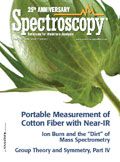Article
Spectroscopy
Spectroscopy
A Welcome Honor for Spectroscopy
It's one thing to believe you are good at something, and another altogether to have that belief reinforced by an objective third party.
It's one thing to believe you are good at something, and another altogether to have that belief reinforced by an objective third party. At Spectroscopy, we have always prided ourselves on the high quality of our content and the hard work that goes into acquiring, producing, and delivering that content to the marketplace. And at this year's annual awards banquet of the American Society of Business Publication Editors, held in July in New York City, this belief was validated, as Spectroscopy's well-known quarterly supplement, Current Trends in Mass Spectrometry, received national recognition with the Silver Award for Best Supplement.
Spectroscopy has won awards in the past, such as the Silver Regional Award in 2008. However, this national recognition, in a category in which the competition consisted of some of the most prestigious publications in the industry, was humbling indeed. More than anything, however, this award is a tribute to the talented research teams at private labs, universities, and government institutes around the world who contribute to this supplement series, in the process bringing us the latest cutting-edge content in the critical and life-affecting field of mass spectrometry. In that sense, we are merely a platform from which these brilliant researchers can reach the marketplace and bring the practicing scientists in this field the latest trends and information that enable them to be more productive in their daily work.
With this in mind, and knowing that it is Spectroscopy's readers who truly drive the publication forward, we would like to invite readers who are interested in learning more about contributing to a future issue to contact us at spectroscopyedit@advanstar.com or use the contact information listed in the masthead. We always welcome new submissions to this and all of our supplemental issues, so please don't hesitate to contact us.
David Walsh
Editor-in-Chief

David Walsh
Newsletter
Get essential updates on the latest spectroscopy technologies, regulatory standards, and best practices—subscribe today to Spectroscopy.





